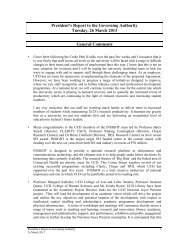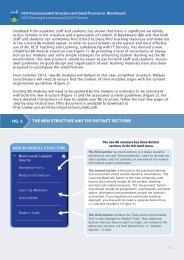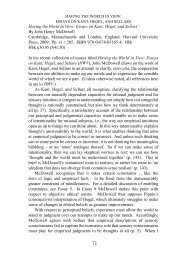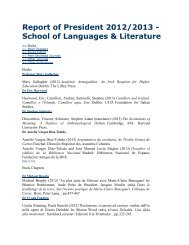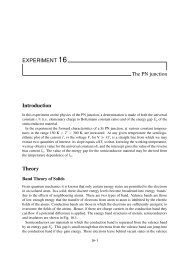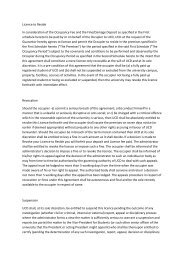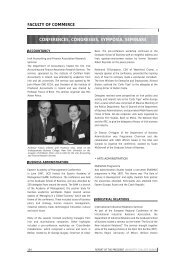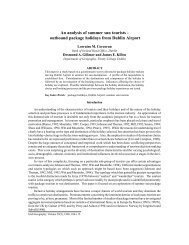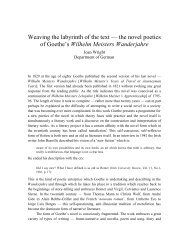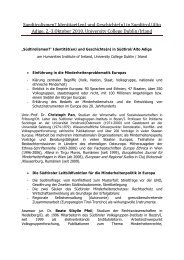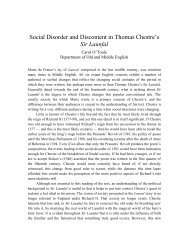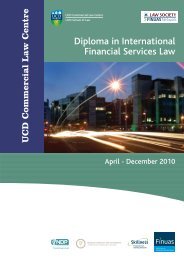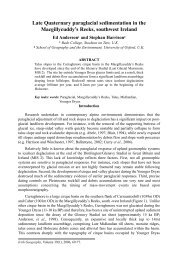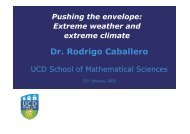Featured in this issue: - University College Dublin
Featured in this issue: - University College Dublin
Featured in this issue: - University College Dublin
You also want an ePaper? Increase the reach of your titles
YUMPU automatically turns print PDFs into web optimized ePapers that Google loves.
decisions<br />
Apply<strong>in</strong>g psychology to economics<br />
When formulat<strong>in</strong>g its policies <strong>in</strong> key areas<br />
such as health, education and pensions, does<br />
the Government take account of human<br />
psychology and how people actually behave?<br />
Many would argue they don't and their<br />
policies are the poorer for that. Dr Liam<br />
Delaney, a senior researcher at the UCD<br />
Geary Institute and lecturer <strong>in</strong> the School of<br />
Economics and the School of Public Health<br />
and Population Science spoke to Sean Duke.<br />
How does economic progress affect people’s<br />
well-be<strong>in</strong>g? How do people respond to<br />
<strong>in</strong>centives <strong>in</strong> areas such as health and education<br />
and how can an understand<strong>in</strong>g of psychology<br />
contribute to economic decision-mak<strong>in</strong>g <strong>in</strong><br />
these areas? How, if at all, do government<br />
communication campaigns <strong>in</strong>fluence<br />
behaviour?<br />
Dr Delaney is work<strong>in</strong>g with many other<br />
researchers across a number of fields, <strong>in</strong>clud<strong>in</strong>g<br />
natural sciences such as neuroscience, to try<br />
and better understand why people make the<br />
decisions they do with regard to key life areas.<br />
His work is currently blend<strong>in</strong>g economics and<br />
psychology, <strong>in</strong> particular, with a view to<br />
ultimately understand<strong>in</strong>g how to better<br />
formulate policy across a range of areas such as<br />
pension policy, health <strong>in</strong>equalities reduction and<br />
higher education strategies.<br />
Background<br />
The application of psychology to economics -<br />
the overarch<strong>in</strong>g area of <strong>in</strong>terest to Dr Delaney -<br />
has its modern roots, somewhat surpris<strong>in</strong>gly, as<br />
far back as the 1970s. Interest <strong>in</strong> the field grew,<br />
and <strong>in</strong> 2002, a pioneer of the field, Dr Daniel<br />
Kahneman, Pr<strong>in</strong>ceton <strong>University</strong>, received a<br />
Nobel Prize <strong>in</strong> economic sciences for hav<strong>in</strong>g<br />
<strong>in</strong>tegrated <strong>in</strong>sights from psychological research<br />
<strong>in</strong>to economic science. This gave a boost to<br />
those researchers that had been us<strong>in</strong>g science<br />
to understand our decision-mak<strong>in</strong>g <strong>in</strong> areas like<br />
f<strong>in</strong>ance, medic<strong>in</strong>e, law and politics.<br />
Today, there are new, emerg<strong>in</strong>g areas, such as<br />
neuro-economics, where the precise<br />
neurobiological reasons for why people make<br />
decisions that affect their own wellbe<strong>in</strong>g are<br />
under <strong>in</strong>vestigation. The idea is to understand<br />
what exactly is happen<strong>in</strong>g <strong>in</strong> the bra<strong>in</strong> when<br />
people make important decisions concern<strong>in</strong>g<br />
their wellbe<strong>in</strong>g <strong>in</strong>to the future.<br />
Research<br />
Dr Delaney's research <strong>in</strong>terests can be divided<br />
<strong>in</strong>to two ma<strong>in</strong> areas. The first area is the study<br />
of decision-mak<strong>in</strong>g <strong>in</strong> different life areas, where<br />
he is, for example, look<strong>in</strong>g <strong>in</strong>to the reasons why<br />
some people decide to take out a pension<br />
relatively early, while others do it much later,<br />
while others never take one out. The other<br />
research area relates economics to life<br />
outcomes such as mental and physical health.<br />
The idea here is to understand how people’s<br />
psychology affects the decisions they make<br />
with regard to their health, and how that<br />
knowledge can be ultimately used to formulate<br />
more effective public policy.<br />
The aims are ambitious, but Dr Delaney is<br />
build<strong>in</strong>g l<strong>in</strong>ks with anyone that can help him<br />
achieve his goals. He is one of a new breed of<br />
researchers that has emerged over the last<br />
decade or so. In the past, researchers <strong>in</strong><br />
economics and neuroscience would have<br />
regarded each others research from afar, if at<br />
all, but that is chang<strong>in</strong>g - and chang<strong>in</strong>g fast.<br />
In the new order of th<strong>in</strong>gs, multi-discipl<strong>in</strong>ary<br />
research is break<strong>in</strong>g down old barriers, and not<br />
just with<strong>in</strong> social science, but also between<br />
social and natural sciences, such as<br />
neuroscience and genetics, with collaboration<br />
happen<strong>in</strong>g <strong>in</strong> a manner that would have been<br />
<strong>in</strong>conceivable a few years ago.<br />
Certa<strong>in</strong>ly a look at Dr Delaney's curriculum<br />
vitae shows that he is <strong>in</strong>terested <strong>in</strong> many<br />
fields, and is <strong>in</strong> a good position to see the<br />
l<strong>in</strong>ks between what others might have regarded<br />
as disparate areas of research. He has a<br />
background <strong>in</strong> economics (PhD) and<br />
psychology, while he is currently study<strong>in</strong>g for a<br />
Master's degree <strong>in</strong> philosophy. He currently<br />
teaches both economics and public health<br />
subjects and is collaborat<strong>in</strong>g actively across<br />
many discipl<strong>in</strong>es.<br />
Dr Delaney wants to use <strong>this</strong> <strong>in</strong>teraction to<br />
understand how people make decisions<br />
impact<strong>in</strong>g on key aspects of their lives, such as<br />
health and education, and for <strong>this</strong>, he needs to<br />
understand more about how the bra<strong>in</strong> works.<br />
This has led to cross-campus l<strong>in</strong>ks with<br />
neuroscientists <strong>in</strong>volved <strong>in</strong> work on suicide<br />
research and on other areas of bra<strong>in</strong><br />
development and bra<strong>in</strong> function.<br />
Dr Delaney commented: "I am <strong>in</strong>terested <strong>in</strong><br />
how people form expectations, and how people<br />
respond to <strong>in</strong>centives, f<strong>in</strong>ancial or otherwise,<br />
and how people respond to large scale policies<br />
such as public health <strong>in</strong>itiatives. To understand<br />
all of <strong>this</strong>, I need to understand more about<br />
what core decision-mak<strong>in</strong>g processes are<br />
<strong>in</strong>volved even at the neural level."<br />
Survey<br />
The ma<strong>in</strong> work to date conducted by Dr<br />
Delaney <strong>in</strong> the UCD Geary Institute has<br />
revolved around large-scale sophisticated<br />
programmed <strong>in</strong>ternet surveys assess<strong>in</strong>g<br />
subjective evaluation and decision-mak<strong>in</strong>g<br />
processes <strong>in</strong> several key life areas. Dr Delaney<br />
has been <strong>in</strong>volved <strong>in</strong> the design and<br />
implementation of large-scale surveys of<br />
approximately 20,000 people <strong>in</strong> the last year<br />
that sought to exam<strong>in</strong>e people's th<strong>in</strong>k<strong>in</strong>g on a<br />
range of social <strong>issue</strong>s such as, health, education<br />
and f<strong>in</strong>ancial decisions. This work, which was<br />
17<br />
carried out <strong>in</strong> web surveys and by other means,<br />
was done <strong>in</strong> conjunction with the Rand<br />
Research Institute, a policy research <strong>in</strong>stitute<br />
based <strong>in</strong> the United States. To date, several<br />
papers have exam<strong>in</strong>ed the personality, life<br />
circumstances, environment and decisionmak<strong>in</strong>g<br />
characteristics of people who dr<strong>in</strong>k<br />
heavily and smoke, as well as people who get<br />
<strong>in</strong>to f<strong>in</strong>ancial difficulties, and how such factors<br />
<strong>in</strong>fluence health, quality of life and wellbe<strong>in</strong>g.<br />
This work is help<strong>in</strong>g policy-makers <strong>in</strong> Ireland to<br />
understand, for example, why some people act<br />
<strong>in</strong> ways that are <strong>in</strong>consistent with their longterm<br />
health and wellbe<strong>in</strong>g and the potential<br />
role of policy <strong>in</strong>terventions.<br />
Dr Delaney said: "Understand<strong>in</strong>g more about<br />
decision-mak<strong>in</strong>g as it affects people's health<br />
could help policy-makers design more effective<br />
public health campaigns, or to justify scrapp<strong>in</strong>g<br />
such campaigns and us<strong>in</strong>g the money<br />
elsewhere. More <strong>in</strong>formation on how people<br />
actually respond to health <strong>in</strong>formation and<br />
health <strong>in</strong>centives can enable the government to<br />
get better value for its €12 billion or so annual<br />
spend on health, and the same goes for<br />
education."<br />
His work at present is particularly focused on<br />
the <strong>in</strong>teraction between economic conditions<br />
and psychological decision-mak<strong>in</strong>g factors <strong>in</strong><br />
expla<strong>in</strong><strong>in</strong>g the big <strong>in</strong>equalities <strong>in</strong> health that we<br />
see <strong>in</strong> society. There are huge <strong>in</strong>equalities when<br />
it comes to health <strong>in</strong> Ireland, said Dr Delaney,<br />
and when people reach the age of 50 there is a<br />
marked difference <strong>in</strong> their physical and mental<br />
health.<br />
“This depends crucially on real economic<br />
circumstances <strong>in</strong>clud<strong>in</strong>g patterns of deprivation<br />
that can last generations. It also depends<br />
crucially on how people manage complex<br />
health <strong>in</strong>formation, how they deal with risk<br />
and how they make decisions with respect<br />
to their own and their children's future.<br />
We need to understand how long-term<br />
economic effects and psychological processes<br />
<strong>in</strong>teract to generate patterns of health<br />
<strong>in</strong>equalities <strong>in</strong> society.”<br />
Future<br />
In the next few years, Dr Delaney has many<br />
excit<strong>in</strong>g areas of research that he wishes to<br />
explore <strong>in</strong>clud<strong>in</strong>g understand<strong>in</strong>g how the<br />
extensive changes <strong>in</strong> the economic structure <strong>in</strong><br />
Ireland affected mental health and suicide<br />
patterns; mapp<strong>in</strong>g <strong>in</strong> detail how environmental<br />
and technological factors <strong>in</strong>fluence day to day<br />
patterns of wellbe<strong>in</strong>g; and understand<strong>in</strong>g <strong>in</strong><br />
greater depth how the bra<strong>in</strong> processes<br />
<strong>in</strong>formation about the future and what <strong>this</strong><br />
implies for how we should th<strong>in</strong>k about fram<strong>in</strong>g<br />
public policy.<br />
It's all about understand<strong>in</strong>g why people behave<br />
the way they do while provid<strong>in</strong>g our policymakers<br />
with better tools to make important<br />
decisions affect<strong>in</strong>g all of society.<br />
Sean Duke (BA 1987) is jo<strong>in</strong>t editor<br />
of Science Sp<strong>in</strong>.



